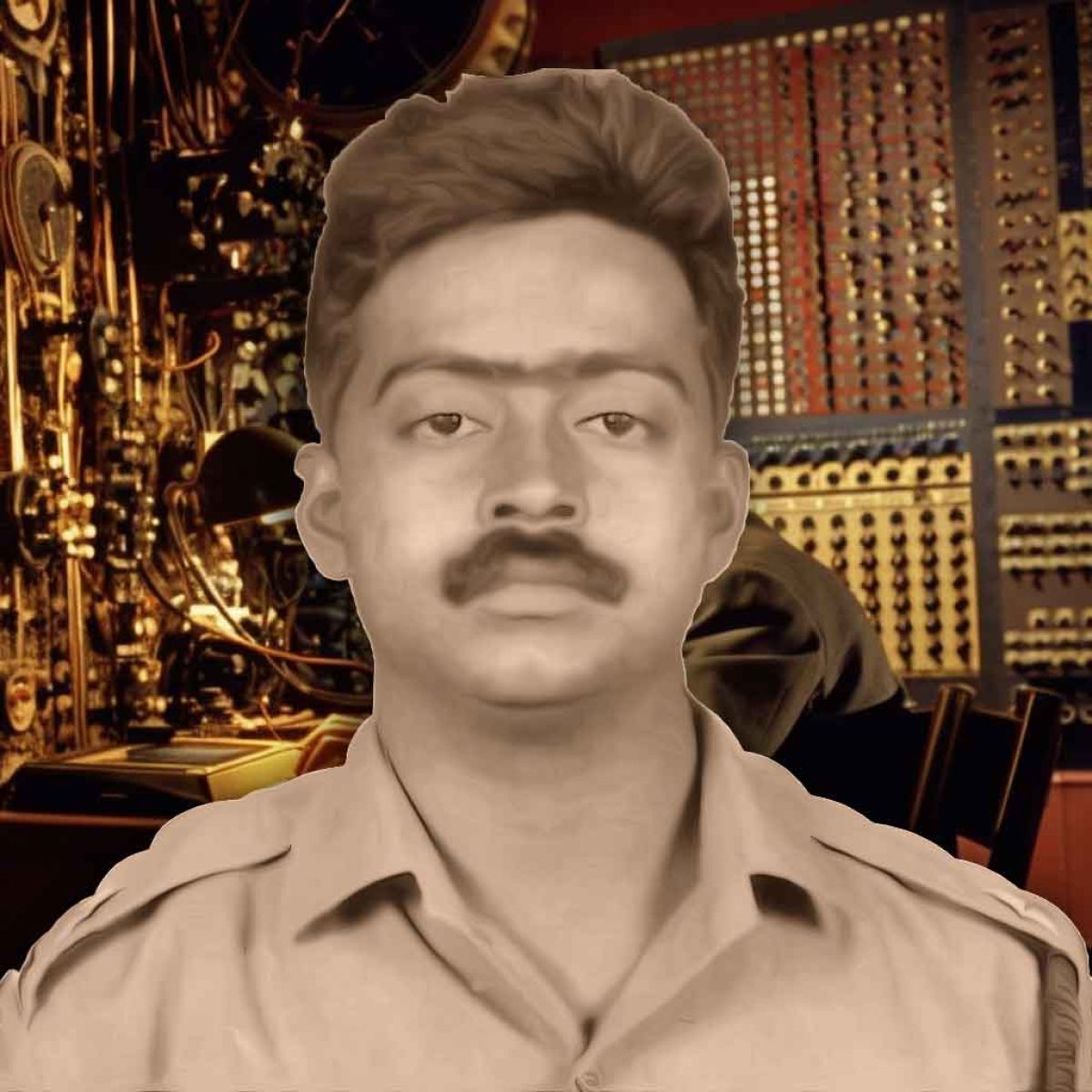More Coverage
Twitter Coverage
Satyaagrah
Written on
Satyaagrah
Written on
Satyaagrah
Written on
Satyaagrah
Written on
Satyaagrah
Written on
JOIN SATYAAGRAH SOCIAL MEDIA
"It's the oldest question of all, Doval. Who can spy on the spies?": 1988 batch Senior IPS officer Ravi Sinha appointed as the new chief of RAW, he has been with intelligence agency for over two decades and worked extensively in Jammu and Kashmir earlier

Ravi Sinha, a senior Indian Police Service (IPS) officer of the 1988 batch from the Chhattisgarh cadre, has been appointed as the new chief of the Research and Analysis Wing (RAW), India's premier intelligence agency. The appointment was approved by the Appointments Committee of the Cabinet, and Sinha will serve as the RAW chief for the next two years.
|
Prior to his appointment as the head of RAW, Ravi Sinha was serving as the Special Secretary in the Cabinet Secretariat (SR). With his vast experience and expertise in the field of intelligence and law enforcement, Sinha is well-equipped to lead RAW in its crucial role of gathering and analyzing intelligence for the security and strategic interests of India.
Sinha will succeed Samant Kumar Goel, a 1984-batch IPS officer from the Punjab cadre, who has been serving as the RAW chief since June 2019.
"The Appointments Committee of Cabinet (ACC) has approved the appointment of Rajiv Sinha, IPS, special secretary, Cabinet Secretariat, as Secretary, Research and Analysis Wing (RAW). Rajiv Sinha, an IPS officer, will take over the position from Samant Kumar Goel upon the completion of Goel's tenure on June 30, 2023. Rajiv Sinha's appointment will be effective for a tenure of two years from the date he assumes the charge of the post, or until further orders, whichever comes earlier."
The Research and Analysis Wing, commonly known as RAW, is India's external intelligence agency responsible for gathering and analyzing intelligence related to national security, counterterrorism, and strategic issues. RAW plays a crucial role in safeguarding India's interests by providing actionable intelligence to policymakers and supporting the country's defense and foreign policies.
As the chief of RAW, Ravi Sinha will be responsible for overseeing and directing the operations of the agency, coordinating with other intelligence and security agencies, and providing timely and accurate intelligence assessments to the government. He will lead a team of dedicated intelligence professionals and analysts, working towards the protection and advancement of India's national security objectives.
The appointment of Ravi Sinha as the RAW chief reflects the government's confidence in his abilities and leadership qualities. His extensive experience in the field of law enforcement and intelligence, coupled with his deep understanding of security challenges, will be instrumental in strengthening RAW's capabilities and enhancing its effectiveness in addressing evolving threats.
At present, the security situation in India and the region is complex and dynamic, with various security challenges such as terrorism, cross-border infiltration, cyber threats, and geopolitical tensions. RAW plays a crucial role in monitoring and countering these threats by collecting intelligence, conducting covert operations, and maintaining strategic relationships with foreign intelligence agencies.
Under Ravi Sinha's leadership, RAW is expected to continue its efforts in gathering actionable intelligence, providing early warning of potential threats, and supporting the government's decision-making process. The agency will work closely with other intelligence and security agencies, both within India and internationally, to ensure the security and stability of the nation.
It is worth noting that the RAW chief's role is highly sensitive and demanding, requiring exceptional leadership, analytical skills, and the ability to navigate complex geopolitical landscapes. The chief is entrusted with the responsibility of protecting national security interests and ensuring the safety of the country and its citizens.
In conclusion, Ravi Sinha's appointment as the new RAW chief marks a significant milestone in India's intelligence community. With his experience, expertise, and leadership, Sinha is well-positioned to guide RAW in its mission to safeguard India's national security interests. As the security landscape continues to evolve, the nation will rely on RAW's intelligence capabilities under Sinha's leadership to address emerging challenges and contribute to India's overall security and well-being.
Samant Kumar Goel's tenure as RAW Chief
Samant Kumar Goel, a distinguished 1984 batch IPS officer from the Punjab cadre, served as the Chief of RAW with remarkable success and received multiple extensions during his tenure. His leadership oversaw significant milestones, including the Balakot Airstrike in Pakistan, the peaceful abrogation of Article 370 in Jammu & Kashmir, and decisive actions against designated Pakistani and Khalistani terrorists.
Goel's strategic acumen and planning were instrumental in orchestrating the Balakot air strike in response to the Pulwama terror attack in Jammu and Kashmir. This military operation, carried out on February 26, 2019, targeted terrorist infrastructure in Balakot, Pakistan, effectively sending a strong message of India's determination to combat terrorism. Furthermore, he played a key role in planning surgical strikes in Uri, where the Indian Army conducted precise operations against seven terrorist launch pads along the Line of Control on September 29, 2016, as a response to an attack on its base earlier that month.
With an extensive background in intelligence and operations, Goel brought invaluable expertise to his role as the RAW Chief. His exceptional capabilities were evident during his service as the head of the Punjab Chief Minister's security from 2000 to 2001, where he demonstrated astute vigilance and safeguarded critical interests. He held several other significant positions within his state cadre and at the central level, contributing to his extensive knowledge and experience in matters concerning Punjab militancy and Pakistan.
Goel's notable achievements extend beyond his tenure as RAW Chief. He played a vital role in combating militancy in Punjab during the 1990s, demonstrating his commitment to upholding national security and preserving peace. Throughout his career, he dedicated a substantial portion of his service to Punjab, acquiring deep insights into the region's complexities and emerging challenges.
Recognizing his exceptional contributions and unwavering commitment to duty, Goel has been honored with prestigious awards. He is a recipient of the Police Medal for Gallantry, a testament to his courage and valor in the face of adversity. Additionally, he has been honored with the Police Medal for Meritorious Service, underscoring his consistent dedication and outstanding performance throughout his service.
Goel's appointment to RAW in March 2001 marked the beginning of an illustrious career within the intelligence community. With his vast experience, strategic mindset, and exceptional track record, he assumed leadership responsibilities that demanded unwavering dedication, astute decision-making, and effective coordination with various stakeholders.
Under Goel's leadership, RAW successfully executed critical operations, advanced intelligence capabilities, and strengthened the agency's role in safeguarding national security. His tenure witnessed notable achievements, highlighting the agency's commitment to countering terrorism, protecting India's interests, and maintaining regional stability.
Samant Kumar Goel's tenure as RAW Chief was marked by his outstanding contributions to India's intelligence community. His leadership during the Balakot Airstrike, surgical strikes in Uri, and efforts in combating militancy in Punjab showcased his strategic acumen and dedication to national security. Goel's accolades, including the Police Medal for Gallantry and Police Medal for Meritorious Service, further exemplify his commendable service to the nation. His tenure as RAW Chief has undoubtedly left a lasting impact, shaping the agency's operations and reinforcing India's commitment to counter terrorism effectively.
Research and Analysis Wing
The Research and Analysis Wing (abbreviated R&AW; Hindi: अनुसंधान और विश्लेषण विंग) is the foreign intelligence agency of India. The agency's primary function is gathering foreign intelligence, counter-terrorism, counter-proliferation, advising Indian policymakers, and advancing India's foreign strategic interests. It is also involved in the security of India's nuclear programme.
During the nine-year tenure of its first Secretary, Rameshwar Nath Kao, R&AW quickly came to prominence in the global intelligence community, playing a role in major events such as accession of the state of Sikkim to India in 1975. Headquartered in New Delhi, R&AW's current chief is Samant Goel. Revi Sinha, IPS (Chattisgarh, 1988) is set to replace him as the next Chief from 1st July 2023. The head of R&AW is designated as the Secretary (Research) in the Cabinet Secretariat, and is under the authority of the Prime Minister of India without parliamentary oversight. On an administrative basis, the Director reports to the Cabinet Secretary, who reports to the Prime Minister.
Prior to the inception of the Research and Analysis Wing, overseas intelligence collection was primarily the responsibility of the Intelligence Bureau (IB), which was created by the Government of India during British Raj. In 1933, sensing the political turmoil in the world which eventually led to the Second World War, the Intelligence Bureau's responsibilities were increased to include the collection of intelligence along India's borders.
In 1947, after independence, Sanjeevi Pillai took over as the first Indian Director of the IB. Having been depleted of trained manpower by the exit of the British after Indian independence, Pillai tried to run the bureau on MI5 lines. In 1949, Pillai organised a small foreign intelligence operation, but the Indian debacle in the Sino-Indian War of 1962 showed it to be ineffective. Foreign intelligence failure during the 1962 Sino-Indian War led then-Prime Minister Jawaharlal Nehru to order a dedicated foreign intelligence agency to be established. After the Indo-Pakistani war of 1965, the Chief of Army Staff, General Joyanto Nath Chaudhuri, also called for more intelligence-gathering. Around the end of 1966 the concept of a separate foreign intelligence agency began to take concrete shape.
The Indira Gandhi administration decided that a full-fledged second security service was needed. R. N. Kao, then a deputy director of the Intelligence Bureau, submitted a blueprint for the new agency. Kao was appointed as the chief of India's first foreign intelligence agency, the Research and Analysis Wing. The R&AW was given the responsibility for strategic external intelligence, human as well as technical, plus concurrent responsibility with the Directorate-General of Military Intelligence for tactical trans-border military intelligence up to a certain depth across the Line of control (LOC) and the international border.
R&AW started as a wing of the main Intelligence Bureau with 250 employees and an annual budget of ₹20 million (US$250,467.10). In the early seventies, its annual budget had risen to ₹300 million (US$3.8 million) while its personnel numbered several thousand. In 2007, the budget of R&AW is speculated to be as high as US$150 million to as low as US$100 million.
Objectives
The present R&AW objectives include:
- Monitoring the political, military, economic and scientific developments in countries which have a direct bearing on India's national security and the formulation of its foreign policy.
- Moulding international public opinion and influence foreign governments.
- Covert Operations to safe guard India's National interests.
- Anti-terror operations and neutralising elements posing a threat to India.
In the past, following the Sino-Indian war of 1962 and due to India's volatile relations with Pakistan, R&AW's objectives had also consisted the following:
- To watch the development of international communism and the schism between the two big communist nations, the Soviet Union and China. As with other countries, both these powers had direct access to the communist parties in India.
- To control and limit the supply of military hardware to Pakistan, from mostly European countries, America and more importantly from China.
 Support Us
Support Us
Satyagraha was born from the heart of our land, with an undying aim to unveil the true essence of Bharat. It seeks to illuminate the hidden tales of our valiant freedom fighters and the rich chronicles that haven't yet sung their complete melody in the mainstream.
While platforms like NDTV and 'The Wire' effortlessly garner funds under the banner of safeguarding democracy, we at Satyagraha walk a different path. Our strength and resonance come from you. In this journey to weave a stronger Bharat, every little contribution amplifies our voice. Let's come together, contribute as you can, and champion the true spirit of our nation.
 |  |  |
| ICICI Bank of Satyaagrah | Razorpay Bank of Satyaagrah | PayPal Bank of Satyaagrah - For International Payments |
If all above doesn't work, then try the LINK below:
Please share the article on other platforms
DISCLAIMER: The author is solely responsible for the views expressed in this article. The author carries the responsibility for citing and/or licensing of images utilized within the text. The website also frequently uses non-commercial images for representational purposes only in line with the article. We are not responsible for the authenticity of such images. If some images have a copyright issue, we request the person/entity to contact us at This email address is being protected from spambots. You need JavaScript enabled to view it. and we will take the necessary actions to resolve the issue.
Related Articles
- "RAW Officer Who Vanished in 2004": The Making of India’s Most Dangerous Double Agent, Rabinder Singh who leaked 212 secret files, exposed agents, collapsed RAW’s networks, and fled to the U.S. via Nepal with CIA help in India’s worst betrayal ever
- "Karma Strikes": Decade-long patience culminates as Delhi's LG sanctions Arundhati Roy's prosecution for her divisive 2010 speech, with BJP countering Chidambaram's remarks and the case gaining momentum, India's stand against sedition takes center stage
- NIA team of 3 members reaches Canada to investigate terrorist org SFJ, other pro-Khalistani groups and their foreign funding links
- Param Bir Singh misused his power and authority in Kesab's inquiry and destroyed his phone: Shocking claims of former ACP
- IT Dept unearths scam in ‘Believers Eastern Church’, funds for charity used to run Churches, proselytisation, got Rs 7,000 crore over the years: Details
- We present a list of trickery, hypocrisy, and biases of the Islamist propagandist Rana Ayyub as she manages to embarrass herself again by infuriating netizens of Saudi Arabia
- "Truth finds its way, no matter the shadows": In a first, senior IPS officer Basant Kumar Rath's controversial stint in Jammu & Kashmir reaches an abrupt end, his early retirement expose a complex web of intrigue and alleged misconduct in the force
- "Dressed in the lion's skin, the ass spread terror far and wide": IB flags security threat from Lashkar-e-Taiba, Jaish-e-Mohammed, and other radical Jihadi groups ahead of I-Day, recommends monitoring areas with Rohingyas, cites Kanhaiya Lal murder too
- Abhishek Bhardwaj, a 20-year-old college dropout from Himachal arrested for spying after police found sensitive military data on his phone and AK-47 visuals on his Facebook—exposing deep Pakistan-linked espionage threats inside India's rural heartland
- Fan pages of former Congress leaders, managed by the Congress IT cell rebranded as Maktoob media: Propaganda portal, publicizing Islamic propaganda and Hindumisia content, promoted by terror apologists
- Fahad Shah, editor of the prominent Srinagar-based news portal 'The Kashmir Walla' arrested for anti-national activities and sharing provocative content on the social media platform
- "What a network": For a withheld tweet of Washington Post columnist Rana Ayyub, she gets support from several ‘journalists’, ‘activists’ and ‘prominent personalities’, people linked to George Soros and his funded Open Society stood out from crowd
- Jawaharlal Nehru University A Centre Of Excellence, But It Must Get Rid Of The Anti-National Forces: JNU at At A Dangerous Inflection Point
- Modi govt crushed Soros-funded Reporters’ Collective’s falsehoods by revoking its non-profit status after it peddled fake poverty data, ignoring NITI Aayog’s work with OPHI & UNDP, while being bankrolled by Ford, Omidyar, Rockefeller, and Open Society
- Was Italian family of Sonia Gandhi involved in the Bofors scam: Papers long buried, questions that were never asked




























